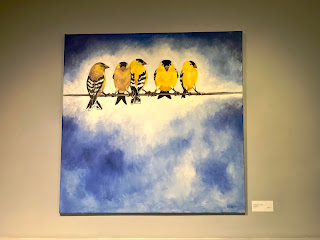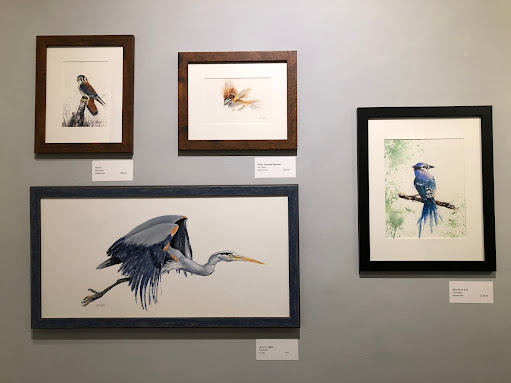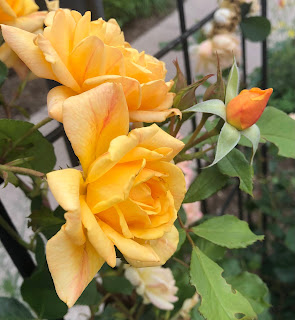To be framed together with a photograph of Grandma, her necklace,
and any other small memento I can find in a shadowbox style frame.
Our grandmother, Therese Grieman Gangl, was born in Minnesota in 1888 and lived until she was 104. She was very talented with her mind and her handiwork, and born at a time when good hand-work was very important in family life. She was the oldest of 12 children born to a Burgenland, Austrian immigrant father and a 2nd generation Bilfingen, Baden, Germany immigrant. German was the language spoken in their home - and continued until my dad went to elementary school and could not speak English. From then on, no German was spoken at home, to teach the 4 children proper English. My dad still remembered German nursery songs that had once been sung to him and played many German/Austrian melodies on the button accordion.
John P Gangl with Therese Grieman in 1909
The Stephen Grieman Family Therese is second from right in this photo.
Grandma was always making something, often out of very little! We know she created several quilts, embroidered bed linens and more, she crocheted many doilies, crocheted kitchen towel hangers, created artificial flowers, and so much more. All of her children, grandchildren and some beyond have something that Grandma once made - many things were kept for her grandchildren's hope chests, as was the tradition in her youth.
Grandma Therese with two oldest children about 1916
I inherited a quilt made around the mid-1920's, likely from a pattern found in the local newspaper with a quilt block for each of the then 40 states, including the flower and bird of each state hand embroidered on white sturdy fabric. I recently learned the Grandma liked to use the edges of worn out sheets for her handiwork, because they were of sturdy construction and were not worn thin with use.
The whole double bed quilt
The quilt was well used by her family and eventually passed down to my Dad, the eldest child, and then to me - a middle child, but the only quilter in the family! I kept it in my maternal grandmother's cedar chest for years - a mistake, for sure. Old fabrics next to wood absorb the tannins into the fibers. But most of the damage was done while still in use by the family. There are obvious spill stains in several places which gentle soaking, washing, rinsing, laying out flat to dry could not remove.
The green border fabric of the quilt is also very fragile and is torn in several places and too fragile to repair. So what does one do with a family heirloom that is slowly disintegrating as time passes? I've worried about this quilt for years and the only idea that keeps coming back to me is to separate the quilt squares and offer them to any of Grandma's descendants who wants one. Granted, I don't even KNOW all of her descendants, but I do remain in contact with most of my cousins, now that we are spread about the country. I was the first to leave our home town, and I've continued to move further and further east as life went on! I'm aware that I have nieces and nephews that now live out of the country!
So yesterday, I wrote my siblings, children, and cousins telling them of this quilt and asking them, if they are interested in having a square, to tell me their first, second and third choices for their chosen states. The responses are heartwarming, grateful, interested, and also include those who believe the quilt should remain whole.
The 40 quilt blocks photographed separately
I totally understand wanting to "save" the quilt as it now is - but I also know that there is no museum who has the appropriate facilities to repair/save the quilt would be interested in this particular quilt. Museums want the BEST of quilts - ones that are done by really great hand quilters, ones that are especially intricate in design, ones that are rare in the block pattern or fabric use or in some way outstanding.
Just as libraries run out of space and remove old books so they can have new ones available, museums face the same quandary. Space is limited - and it must be temp and humidity controlled, etc. It simply is not realistic to preserve the quilt by donating it to a museum that has little storage or none of the right type of storage.
Grandma's quilt was a utilitarian quilt using a pattern that was common throughout the US in the 1920's. She was living at the poverty level and used what scraps she could get from the laundry where she worked. There are many examples of it in museums throughout the country, many that are far superior in technique. And if you've never hear of the "Quilt Police," you aren't a quilter! The standards for quilts are incredibly high!
It is my belief that Grandma would want to share her work with as many of her descendants as she once knew, held, and loved - and to their descendants.
And so the decision has been made, and offered to my family members. Several have made their selections known to me - I've created an Excel spreadsheet to keep track of 1st, 2nd, and 3rd choices by those wishing a block. I hope that everyone will be able to receive their 1st or 2nd choice, but we only have 40 blocks to share! Fortunately for some, the photographs and stories will be enough.
I know when the time comes to actually cut this heirloom into 40 pieces, it will be difficult for me to do. But Grandma will be with me, helping me to pass on mementos of her love for her children, grandchildren, and beyond.
The top half of her quilt
The bottom half of her quilt
My favorite photo of Grandma and our son abt.1975


















































